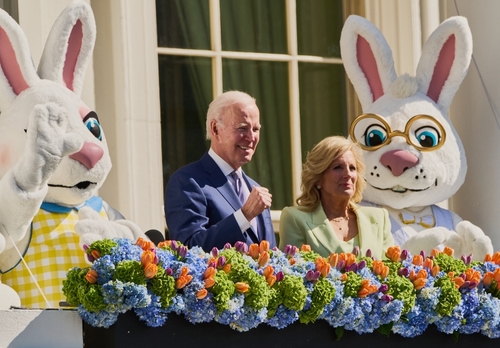
In a startling revelation that has sent shockwaves through the heart of America, Senator Tommy Tuberville (R-AL) has boldly accused the Democratic Party of embodying a "Satanic cult," igniting a firestorm of controversy and debate. This accusation comes in the wake of the Biden White House's decision to exclude religious themes from an Easter Egg contest for children of National Guard members, coupled with the declaration of Easter Sunday as "Transgender Day of Visibility." These actions have not only sparked outrage but have also raised questions about the underlying motives of the Democratic leadership.
On March 30, 2024, Senator Tuberville took to Twitter to voice his concerns, drawing a direct line between the Democrats' policies and what he perceives as a broader, more sinister agenda. His comments have resonated with many Americans who feel alienated by the current administration's stance on religious and moral issues. The senator's critique extends beyond the Easter controversy, touching on deeper fears about the erosion of traditional values and the infiltration of a "satanic cult" into the fabric of American society.
Only Satanic paganism for the democrats. Nothing less will do. Moloch gets what Moloch wants. https://t.co/v6Oqlc6yZd
— Thomas Tatum (@JackSmart007) March 30, 2024
The reaction to Tuberville's statements has been mixed, with figures like Reed Galen of The Lincoln Project challenging Republican voters to distance themselves from what he describes as extremist views. However, this call to action seems to overlook the growing concern among conservatives about the direction in which the country is headed. For many, Tuberville's words are not the ramblings of an outlier but a clarion call to defend the nation's moral foundation.
At the heart of this debate is President Biden's proclamation of March 31, 2024, as Transgender Day of Visibility. While intended as a gesture of inclusivity and support for the transgender community, it has inadvertently fueled the flames of discord, with critics arguing that it symbolizes a departure from traditional American values. The proclamation's message of love and belonging, while noble, has been interpreted by some as an endorsement of a progressive agenda that undermines the nation's Judeo-Christian heritage.
The democrats have become satanic,they've sold their souls to the alphabet Mafia. They love abortion,homosexuality,transgenderism, and all other forms of imoral acts https://t.co/gQwZqF5dxo
— Marcus (@Marcusatim68) March 30, 2024
Senator Tuberville's previous remarks, made during a campaign speech in Utah, further underscore his belief in the existential threat posed by what he calls a "satanic cult." According to Tuberville, this shadowy force is actively working to groom America's children, steering them away from the principles enshrined in the Constitution and the Bible. His stark warning paints a picture of a nation at a crossroads, forced to choose between its foundational values and a new, uncharted path.
The juxtaposition of the Biden administration's actions with Tuberville's accusations raises important questions about the role of religion and morality in public life. As the United States grapples with issues of identity, inclusion, and cultural change, the Easter controversy serves as a microcosm of the broader tensions that permeate American politics. It highlights the deep divisions that exist between those who advocate for a progressive vision of the future and those who seek to preserve the nation's traditional mores.
In light of these developments, it is imperative for Americans to engage in a thoughtful and respectful dialogue about the values that define their country. The accusations of a "satanic cult" may seem extreme to some, but they reflect a genuine concern about the direction in which the nation is heading. Whether one agrees with Senator Tuberville's assessment or not, it is clear that the United States is at a pivotal moment in its history, facing challenges that will determine the character of its society for generations to come.
As the debate over the Easter controversy and the alleged satanic agenda of the Democrats continues to unfold, it is crucial for all citizens to remain vigilant and informed. The battle for the soul of America is far from over, and it will require the collective effort of its people to navigate the complex moral and ethical landscape that lies ahead. Only by confronting these issues head-on can the nation hope to emerge stronger, more united, and true to its founding ideals.













